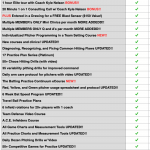9 tips to get your coaching career started
As you enter into the world of professional coaching, there are many different avenues you can take, and many different paths to success. This blog post contains 9 tips to getting your coaching career of to a great start.
1.) Don’t be set in your ways - I cannot even begin to tell you how much I have learned since I knew it all as a 23 year old head coach. The greatest thing I have learned as a coach is that I don’t know everything.
Obviously, I have certain convictions that I have held since I was a young coach, but many of my philosophies on coaching, leading young men, techniques and tactics have evolved over time. If you’re looking to get a head start on your coaching career, being a know-it-all is a sure fire way to run into several dead ends.
Instead, question everything you do. A great question to ask yourself is, “if we were starting from scratch, is the way we would do it?” It can give you perspective on why you do what you do, and can keep you out of the “because we have always done it that way” rut.
2.) Be a selective sponge - Listen to everyone who will talk about baseball, but don’t take it all as the gospel. You will hear so many different philosophies on every aspect of baseball it will make your head spin. Looking online for info will make your head spin even more (says the online baseball coaching guy!!!).
So you need to be a sponge, but you need to filter the info that you find valid, and that matches your philosophy and goals, and the info that you don’t. As someone who has been a head coach for 12 years, trust me, you cannot install EVERYTHING you learn in a single season.
So prioritize what you want to accomplish each year, and find the best information you can that matches your coaching philosophy and your program’s needs.
3.) Volunteer - There is NOTHING more valuable to a head coach than a great volunteer. It may seem obvious that early in your career as you are beginning to build your resume, volunteering is a great idea, but it is not so obvious that volunteering may be better for your career in the long term than taking a paid position in your first few years.
I realize that volunteering over taking a paid position as a young coach can be very tough because money is probably at a premium for you, and it is not the right thing to do in every situation. But in the right situation, being a volunteer could be worse for your short term, but could be exponentially better for your long term career.
So why could it be better to be a volunteer than a paid coach in your first few years? The answer is simple, you get to choose who work for. If you are volunteering, you can seek out the best staff, the best head coach, and the best program for you to work with and learn from.
If you are seeking a paid position, it is possible you are able to land one on a great staff where you will learn a lot, but it is more likely those jobs are already taken. If you want to get on one of those staffs, you may need to be a volunteer.
In addition to volunteering to coach with a staff that you think highly of, you should also volunteer to work camps and clinics for coaches who are highly established. Running camps and giving individual lessons is often a huge part of developing a program at almost any level, so seeing how it is done from the inside can be very beneficial.
Another great opportunity to volunteer is on summer teams. Find the local American Legion team, or college summer league team to build your experience, knowledge, and resume.
Click here to get the other 6 tips
More from my site
 CCA Podcast 093: Maximizing your batting practice routine
CCA Podcast 093: Maximizing your batting practice routine CCA Podcast 126 – 6 team drills for 2018 (part 1 of 2)
CCA Podcast 126 – 6 team drills for 2018 (part 1 of 2) Mini – Don’t feel inferior, have a plan
Mini – Don’t feel inferior, have a plan CCA Podcast 201 – January Elite Q and A Sneak Peek – Practice Planning
CCA Podcast 201 – January Elite Q and A Sneak Peek – Practice Planning CCA Podcast 168 – Pitcher Usage Program for In Season Development
CCA Podcast 168 – Pitcher Usage Program for In Season Development Mini – Playing the game the right way
Mini – Playing the game the right way
 Posted by Kyle Nelson
Posted by Kyle Nelson- Posted in Coaching Philosophy
 Sep, 18, 2015
Sep, 18, 2015 No Comments.
No Comments.
Elite members login here
Check out what’s New/Hot!
Recognizing, Diagnosing, and Fixing Common Hitting Flaws eCourse The 3 metrics we tested on Blast motion sensors this year Sneak Peek Inside an Elite Q and A The batting practice continuum Elite Member’s area table of contents 50+ “Chaos” hitting drills
5 sample Chaos hitting drills FREE
Mental Skills and Culture Building The hitting pyramid Welcome Elite Member, Trey! Ideas for a pitcher first practice 12 week bat speed improvement plan Make plans this offseason to have your team playing their best baseball at the end of the year” Top 5 hitting drills to translate practice skill to game performanceHow we used Blast Motion sensors with a team in 2019
What to do if your hitters are overmatched Welcome Elite Member, Tommy! Setting your baserunners up for success Welcome Elite Member, Mike! A consulting call with Elite Member Matt FREE Web Clinic: Developing Athletic, Consistent, Extraordinary Infielders
 Coach Kyle Nelson
Coach Kyle Nelson